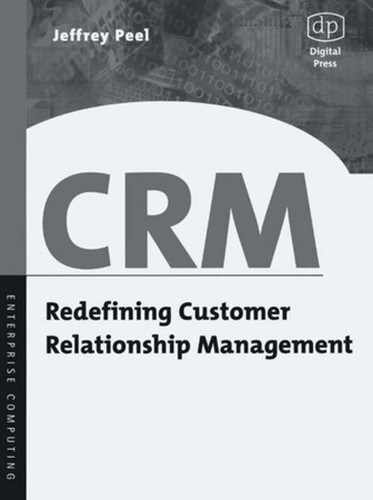
92 6.3 LDO-focused CRM definitions
technologies that defined CRM. "Of course CRM is not just about call-
centers, it's about so much more," they proclaimed. They were able to see spe-
cific processes relating to Web trading that could be identified and described
and partitioned. As consumers engaged in a dot-corn site they interacted with
the site. "Hey, that's collaboration~that's collaborative CRM," they said.
And as they bought goods from the site, the dot-corn could build up patterns
of purchasing behavior that would allow cross-selling: analytical CRM.
Not so. Because missing from the picture, often, was any desire on the
part of the customer to develop a "relationship" with the dot-com. After all,
one can take only so much of tell-sell, cross-selling messages, and cumber-
some, dehumanizing Web-based shopping environments.
6.3
LDO-focused CRM definitions
These CRM extensions, these new facets of CRM, were as weak as the Web
sites from which their definitions emanated. And they should die. Tactical,
Web-centric definitions of CRM should be replaced. I'm laboring the point, I
know, but CRM is inherently about appropriate and considered communica-
tion with customers to facilitate customer transactions and hopefully foster a
long-term relationship for profitable gain.
If dot-corns are about tell-selling (i.e., laying out a stall of goods in the
hope that someone, somewhere, will want to buy), what is the obverse? Well,
consultative selling. Consultative selling is about eliciting a customer's innate
needs (or wants) prior to offering a product. Invariably, large companies are
much better at satisfying customers' custom needs than small dot-corns.
Think of a large supermarket. In the supermarket will be literally thousands of
items grouped conveniently into categories. However, the line items in each
category are carefully selected based on historic customer purchasing behav-
ior. Lines that are unsuccessful are dropped. Supermarkets expect certain
marketing support before stocking new items or giving prominence to them.
Therefore, the supermarket portfolio of product lines is constantly being
refined and updated based on the actuality of consumer behavior.
But let's look at an even more complex example~banking. Banks, par-
ticularly the larger ones, now offer a host of products in addition to savings
and checking accounts. The most successful ones, such as First Direct in
the United Kingdom, base their customer relationship building on the back
of customer demographics such as income level, spending habits, and life-
style factors. First Direct uses direct contact with the customer as an opportu-
..................Content has been hidden....................
You can't read the all page of ebook, please click here login for view all page.
